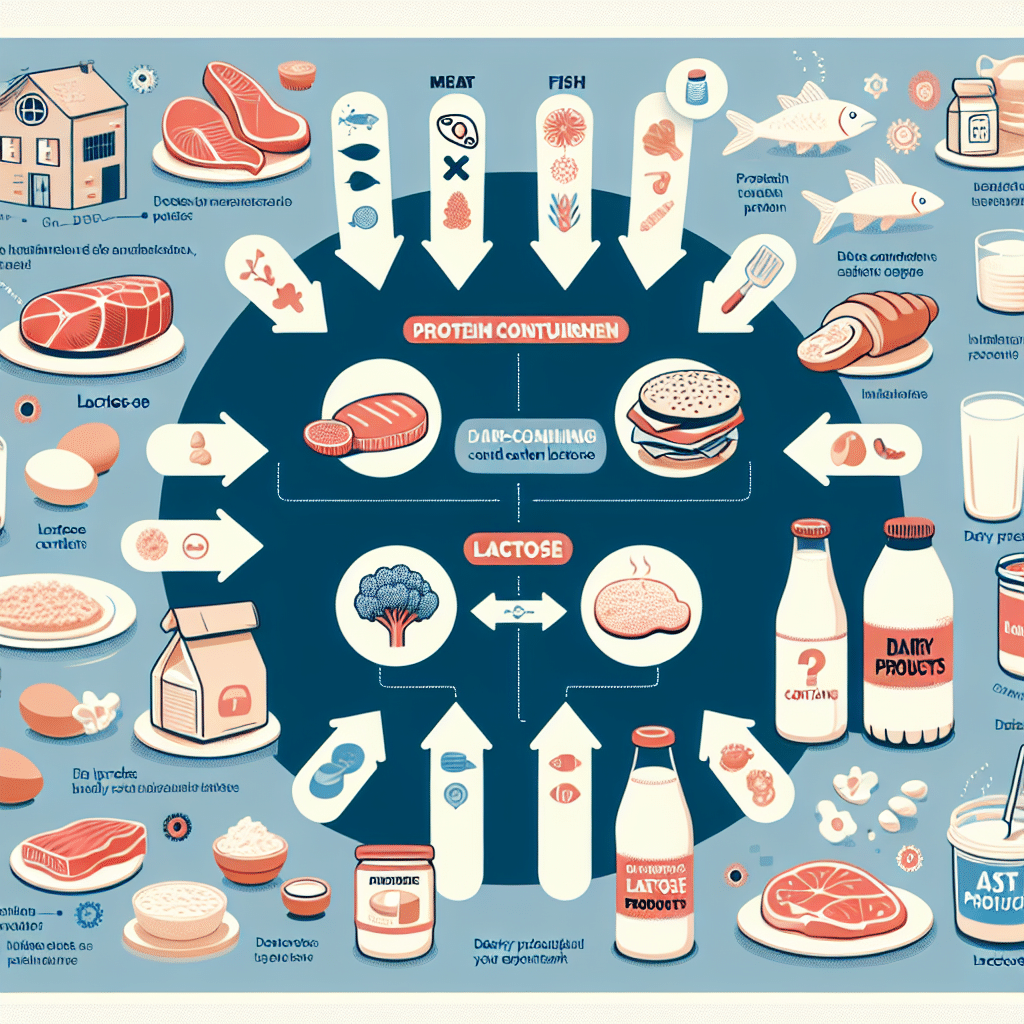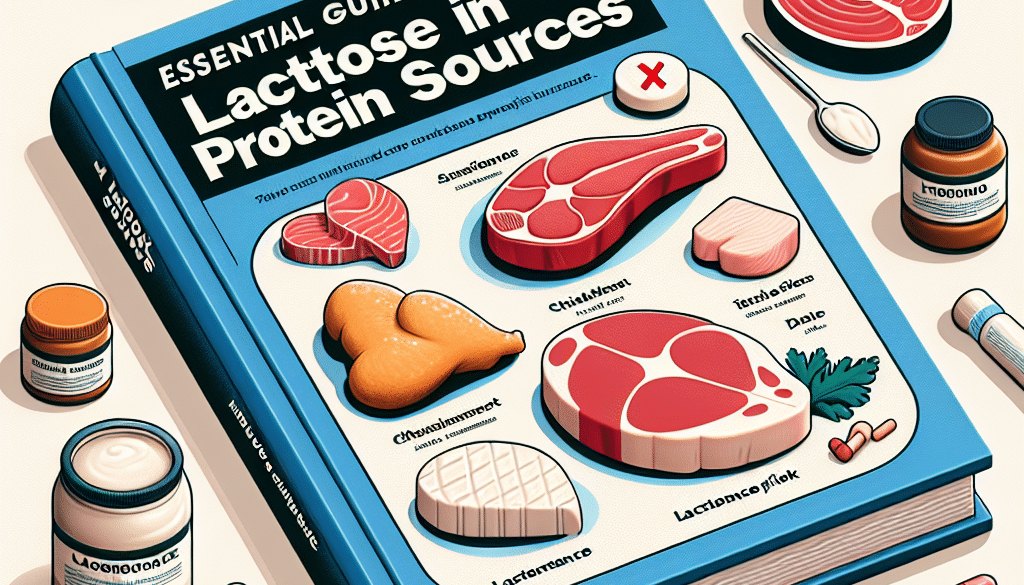Which Protein Source Contains Lactose: Essential Guide
-
Table of Contents
- Lactose in Protein Sources: An Essential Guide for Dietary Choices
- Understanding Lactose and Its Dietary Impact
- Protein Sources Containing Lactose
- Protein Sources Free of Lactose
- How to Identify Lactose in Protein Products
- Case Studies and Statistics on Lactose Intolerance
- Conclusion: Making Informed Protein Choices
- Discover ETprotein’s Lactose-Free Protein Products
Lactose in Protein Sources: An Essential Guide for Dietary Choices

When it comes to protein intake, one of the factors that individuals often consider is the presence of lactose, especially if they are lactose intolerant or have a sensitivity to dairy products. Understanding which protein sources contain lactose is crucial for maintaining a balanced diet without experiencing discomfort or adverse health effects. In this comprehensive guide, we will explore various protein sources and identify which ones contain lactose, providing valuable insights for those looking to make informed dietary choices.
Understanding Lactose and Its Dietary Impact
Lactose is a type of sugar found in milk and dairy products. It is a disaccharide composed of two simpler sugars, glucose and galactose. For lactose to be properly digested, the enzyme lactase must be present in the small intestine to break it down. However, many people lack sufficient levels of lactase, leading to lactose intolerance, which can cause symptoms such as bloating, gas, and diarrhea.
Protein Sources Containing Lactose
When considering protein sources, it’s important to distinguish between those that are derived from dairy and those that are not. Here are some common protein sources that contain lactose:
- Whey Protein: Whey is a byproduct of cheese production and is a popular protein supplement. It contains lactose, although the amount can vary depending on the type of whey protein (concentrate, isolate, or hydrolysate).
- Casein Protein: Casein is another milk-derived protein that is often used in protein powders and supplements. Like whey, it contains lactose, but the content can differ based on the processing method.
- Milk Protein: Milk protein includes both whey and casein and is found in milk and dairy products like cheese, yogurt, and cream. These are direct sources of lactose.
- Dairy-Based Meal Replacements: Many meal replacement shakes and bars are made with dairy proteins and therefore contain lactose.
It’s important to note that lactose content can be reduced in some dairy-based protein products through processing techniques. For example, whey protein isolate typically has less lactose than whey protein concentrate due to the additional filtration processes it undergoes.
Protein Sources Free of Lactose
For those looking to avoid lactose, there are several protein-rich options that are naturally lactose-free:
- Plant-Based Proteins: Proteins derived from plants, such as peas, rice, soy, hemp, and other seeds, do not contain lactose. These are excellent alternatives for vegetarians, vegans, and those with dairy sensitivities.
- Meat, Poultry, and Fish: Animal proteins such as beef, chicken, turkey, and fish are naturally free of lactose and provide high-quality protein.
- Eggs: Eggs are a complete protein source and do not contain lactose, making them suitable for those with lactose intolerance.
- Lactose-Free Dairy Products: Some dairy products are specifically processed to remove lactose or have lactase added to them, making them digestible for those with lactose intolerance.
When choosing lactose-free protein sources, it’s also important to consider other dietary restrictions or preferences, such as allergies to soy or nuts, or adherence to a vegan diet.
How to Identify Lactose in Protein Products
Reading labels is key to identifying lactose in protein products. Look for terms like “milk solids,” “milk sugar,” “whey,” or “casein” on the ingredient list. Additionally, products labeled as “lactose-free” are suitable for those with lactose intolerance. When in doubt, consult with a healthcare provider or a dietitian.
Case Studies and Statistics on Lactose Intolerance
Lactose intolerance affects a significant portion of the global population, with prevalence rates varying by ethnicity and region. For example, it is estimated that up to 90% of East Asians, 70% of Africans and African Americans, and 50% of Mediterranean people are lactose intolerant. These statistics highlight the importance of understanding and managing lactose intake in protein sources.
Case studies have shown that individuals with lactose intolerance can manage their symptoms by choosing lactose-free protein sources or using lactase enzyme supplements when consuming dairy products. This allows them to maintain a balanced diet without compromising their protein intake.
Conclusion: Making Informed Protein Choices
In conclusion, knowing which protein sources contain lactose is essential for those with lactose intolerance or sensitivity. By choosing lactose-free protein options or opting for lactose-reduced or treated dairy products, individuals can enjoy the benefits of protein without experiencing discomfort. It’s important to read labels carefully and consult with healthcare professionals when necessary to make the best dietary choices for your health and well-being.
Discover ETprotein’s Lactose-Free Protein Products
If you’re looking for high-quality, lactose-free protein sources, ETprotein offers a range of plant-based protein products that cater to various dietary needs. Their selection includes organic rice protein, clear rice protein, pea protein, and proteins derived from watermelon seeds, pumpkin seeds, sunflower seeds, mung beans, and peanuts. These products are non-GMO, allergen-free, and have a neutral taste, making them ideal for a variety of applications in the food and beverage industry.
ETprotein’s commitment to quality and customer satisfaction makes them a top choice for those seeking plant-based protein solutions. Whether you’re a manufacturer, trader, or distributor, ETprotein can provide the protein products you need to meet your customers’ demands.
About ETprotein:
ETprotein, a reputable plant protein vegan protein Chinese factory manufacturer and supplier, is renowned for producing, stocking, exporting, and delivering the highest quality organic bulk vegan protein and plant proteins. They include Organic rice protein, clear rice protein, pea protein, clear pea protein, watermelon seed protein, pumpkin seed protein, sunflower seed protein, mung bean protein, peanut protein etc. Their offerings, characterized by a neutral taste, non-GMO, allergen-free attributes, cater to a diverse range of industries. They serve nutraceutical, pharmaceutical, cosmeceutical, veterinary, as well as food and beverage finished product distributors, traders, and manufacturers across Europe, USA, Canada, Australia, Thailand, Japan, Korea, Brazil, and Chile, among others.
ETprotein specialization includes exporting and delivering tailor-made protein powder and finished nutritional supplements. Their extensive product range covers sectors like Food and Beverage, Sports Nutrition, Weight Management, Dietary Supplements, Health and Wellness Products, and Infant Formula, ensuring comprehensive solutions to meet all your protein needs.
As a trusted company by leading global food and beverage brands and Fortune 500 companies, ETprotein reinforces China’s reputation in the global arena. For more information or to sample their products, please contact them and email sales(at)ETprotein.com today.












